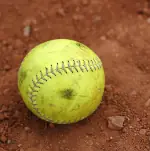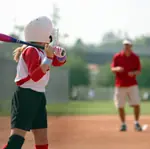Coaches tend to use the same drills over and over. That's especially true with softball hitting drills, which can get pretty boring for the players. And when players are bored they don't get as much as out of practice.
Variety is not only important for motivation but also to throw a different learning stimulus to your athletes. They need to be challenged in order to improve.
To help you spice up your hitting practices, here are a few softball hitting drills to keep things fun:
Pepper Game
To develop bat control and a short, quick swing. Stand approximately 22 feet away from the three fielders who position themselves two feet apart.
Hit the ball using a short, quick, downward stroke. Hit the ball sharply with one or two hops (ground balls) to the fielders. A fielder fields the ball and quickly tosses a half to three quarter speed pitch back to be hit. Hit the ball where it is pitched.
Preferably use four players in this drill and not more than five. Hit the inside pitch to the fielder to your left (for a right-handed batter). Hit the pitch in the middle to the fielder directly in front of you. Hit the outside pitch to the fielder to your right (for a right-handed batter).
To make the drill more difficult, use two softballs at once; keeping the hitter constantly ready to swing and fielders always heads-up.
Colored Ball Soft Toss
The hitter learns to concentrate and keep the weight back. The coach tosses the two balls at different heights. The coach calls the color to hit after the balls are released. The hitter hits the called ball into the fence or screen.
This drill can be done from different locations. The coach should also fake toss and change the release points as well as vary the speed of the balls.
Variations
- Once you've mastered the first version of this drill, try three balls. Or allow your partner to call out colors that aren't being tossed.
- You might even try to write numbers on the ball with a magic marker--simply have your partner call out the number to hit, just like you did with colors.
- Instead of coloring the balls, simply use regular baseballs and have the tosser call out "high" or "low." By switching between the high and low ball, the hitter learns to adjust to high pitches when he was expecting a low pitch and vice versa.
Two Hand Bat
To hit the ball on a line to the opposite field, emphasizing the use of the top hand. A feeder sits in a chair behind an L-shaped screen about 10 feet away from the plate. A hitter stands at the plate in front of the screen, ready to hit.
The feeder throws the ball on the outside of the plate to the hitter. The hitter hits the ball to the opposite field, emphasizing the use of the top hand. The hitter takes 10 to 12 swings before a new hitter steps in.
Hitting Fungoes
To develop proper hand action, weight shift, downward swing, and follow-through. Players who are waiting on deck hit fungoes to the fielders on their side of the infield.
Include up to four hitters in each of three hitting stations. Hitters rotate to the back of the line of another hitting station after taking a certain number of swings.
After a complete rotation of the hitters through all three hitting stations, one line can rotate to the infield spots and the infielders can come in to bat. Concentrate on hitting the top half of the baseball with a short, downward swing.
Bounce in Front
To practice the hitting rhythm and the trigger and the learn to hit the ball at the top of the bounce.
The partner stands six feet to the side and three feet in front of the batter and tosses a tennis ball that bounces up into the strike zone in front of the plate.
As the ball bounces the batter "triggers" and gets her hands started into the swing. She waits until the ball is at the height of the bounce before swinging and driving it into a net.
Broomstick
To narrow your focus while grooving your swing. A feeder kneels about 10 feet away, just off your front knee.
The feeder triggers your cocking action by dropping his hand just before flipping the plastic golf ball. Hit the ball with a broomstick or hit stick, driving the ball into the net.
At first, make a smooth swing at about 90 percent normal bat speed to be sure to make contact. Concentrate on hitting the ball squarely. Maintain good balance, weight shift, hand action and a sound finish.
Drop Toss
To develop hand speed for the ball. The batter assumes her stance with a partner facing her with the ball held at shoulder height.
The batter tells the partner when to drop the ball. The partner releases the ball and pulls her arm up away from the strike zone. The batter takes a full swing. The partner can stand on a chair or on the bleachers, which will add a challenging tracking test.
Now you have a couple of new softball hitting drills to spice up your practices.









Discuss This Article